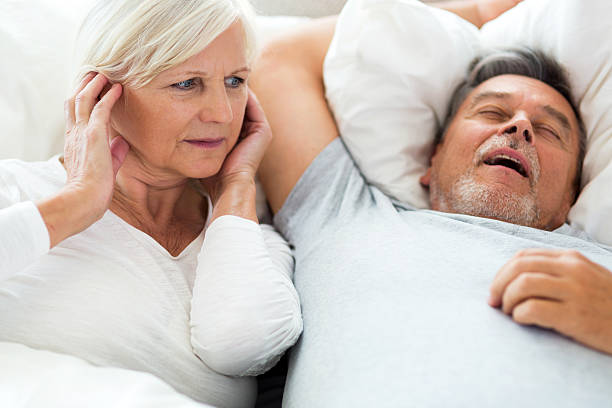The #1 Rated Blood Sugar Formula
Snoring Linked to High Blood Pressure

Snoring and high blood pressure
It's not difficult to believe that snoring can cause high blood pressure -- for the other person in the bed. But now a new study shows that people who snore, or have other problems breathing while they're asleep, are the ones at increased risk for high blood pressure. And the younger you are, the higher the risk.
This goes not only for the person whose snoring wakes up the neighborhood, but even simple snoring may be a warning sign. Researchers recommend that people with breathing problems during sleep get checked for high blood pressure, and vice versa.
Breathing while asleep
Breathing problems while sleeping are more common than most people realize. Quite a few people experience small 'gaps' when they stop breathing during sleep. These gaps may occur 10, 15 or even 20 times an hour. Eventually the person 'comes to' with a gasp and starts breathing again, but this process keeps them from getting the deep sleep they need. This condition is known as sleep apnea, and many people don't even realize they have it.
"It's been assumed all along if patients have sleep apnea, they are at increased risk for high blood pressure," study author Edward O. Bixler, PhD, tells WebMD. "However, both conditions are more common as people get older, so it's hard to know what causes what." Bixler is professor of psychiatry at Pennsylvania State University College of Medicine in Hershey.
All about sleep observation
Earlier studies gave confusing results because they didn't include enough people or didn't actually observe people while they were asleep. In this study, published in the current issue of the Archives of Internal Medicine, the research team spoke to more than 16,000 people by phone and asked about their sleep patterns and general health.
The researchers then looked further at 1,700 people from that group, because the people already had some risk factors for breathing problems during sleep such as snoring, daytime sleepiness, obesity, and for women, menopause. These men and women were given a physical exam, and they stayed overnight in the sleep laboratory where their breathing patterns could be observed.
Sleep apnea and blood pressure
The research team found sleep apnea and even simple snoring are associated with high blood pressure, to varying degrees. Bixler says people with moderate to severe sleep apnea were almost seven times more likely to have high blood pressure, but even those with simple snoring and no apnea at all were one-and-a-half times more likely to have high blood pressure than those who did not snore.
"The strength of this association decreases with age." Bixler says. "The take-home message here is that it's the young we need to be concerned about. Simple snoring does have an associated risk, especially in the young."
"This is the third study published within a few months showing an independent association between high blood pressure and sleep-disordered breathing," Terry Young, PhD, tells WebMD. "Most sleep-disordered breathing and apnea remain undiagnosed, and these symptoms need to be taken seriously." Young is a professor of preventive medicine at the University of Wisconsin Medical School in Madison.
The association seems to be stronger in relatively young people, those below age 60, Young says. As people age, they experience many possible causes of high blood pressure, but in younger people sleep breathing problems seem to account for a larger proportion of high blood pressure.











